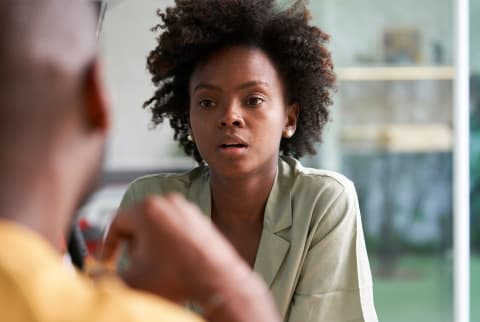Advertisement
How Your Defensive Instincts Sabotage Your Relationships, From A Psychoanalyst


In psychoanalytic theory, a defense mechanism is an unconscious psychological operation that functions to protect a person from anxiety-producing thoughts and feelings.
Defensiveness is a common psychological defense mechanism that people use when they feel they are under some kind of interpersonal threat.
However, when it comes to your partnership dynamic, defensiveness will sabotage conflict every time, and it will keep both of you from feeling safe.
How our desire to defend ourselves actually causes more harm
Defensiveness is one of the so-called four horsemen of the apocalypse, which are four unhealthy communication behaviors identified by psychologist John Gottman, Ph.D., and his team as being predictors of divorce. When defensiveness is present, it is an indication that the foundation of a relationship house is in danger of cracking.
Defensiveness comes in many forms. Here are a few examples of what defensiveness can sound like:
- Defensive dismissal: "I don't know why you're so concerned about that. It's not a big deal."
- Defensive disowning: "I'm not being defensive. YOU'RE being defensive."
- Defensive rationale or explanation: "The reason that I was so short-tempered was because I had such a long day at work with so much stress."
- Defensive victimization: "You're always asking me for something!"
(Here are some other common signs of defensiveness if you're not quite sure.)
Defensiveness is often a strategy we learned in our early development either because of how we were treated or how we learned to protect ourselves from the attachment distress we may have experienced as children. It's never our fault that as children we were taught to relate in unhealthy ways, but it is our responsibility as adults to heal these parts of ourselves.
Anyone in a relationship can attest to the fact that, when you are on the receiving end of someone's defensive behavior, the impact is that you don't feel seen, heard, or understood. However, the negative impact of defensiveness extends beyond the destruction it can wreak on your relationships; defensiveness can keep you arrested in an emotionally immature version of yourself because defensiveness interrupts your ability to listen to your partner and to take in the reflection of the person closest to you.
Here are a few more ways that this defense mechanism hurts you just as much as it will hurt the person on the other side of your defensive behavior:
Disrupts listening
Defensiveness interrupts your ability to listen to your partner. Even if you aren't speaking yet, you will be mounting an argument in your head and not only will you miss the message from your partner. They will also not feel heard, which will escalate conflict.
Discourages connection
Defensiveness will stop connection. When your partner doesn't feel they can reach you, they will stop trying.
Prevents growth
Defensiveness attempts to keep criticism out, but it will also keep out growth. The single most important way we become more emotionally and relationally mature is from taking in other people's expressions about how they experience us and also by responding to our partner's needs.
Allows conflicts to escalate
Defensiveness will keep you from learning to take accountability, which is the single most important relational skill that de-escalates conflict.
Promotes isolation
Defensiveness will mean people begin to leave you alone. If people are repeatedly met with your refusal to take accountability, or worse, if you turn the tables and attack them as part of your defense, people will stop trying to reach you.
Splitting
Defensiveness splits you into two people. The "you" you are protecting, and the "you" that is doing the protection. We are all composed of many parts. When you put down defensiveness and let yourself and your partner see your vulnerability, you are whole.
Teaches children unhelpful conflict behaviors
Defensiveness is bad modeling for your children. Defensiveness teaches children black-and-white thinking. Defensiveness demonstrates to children that someone is "right" and someone is "wrong," which is not how relationships work, and so your children will suffer as a result of this inheritance.
What to do instead
When your partner asks for something, or shares their experience with you, they want to feel that you are receptive to them. If they are being reasonable in their expression, your job is to defend and protect your connection with your partner, and you can do that by being receptive to their expression.
Protect the relationship by validating your partner's experience and letting them know you are open to receiving what they are saying. For example: "You're right, I should have picked up the dry cleaning. I'm sorry. I'll do it tomorrow." Put yourself in their shoes, and if you can see even 10% of their perspective, try yielding to their expression: "Yes, you're right, sometimes I can be really forgetful. I'm working on it."
Your verbal receptiveness to your partner's experience will go a long way.
The takeaway
Of course, not everything that our partner reflects about how we have impacted them is the full truth, but if we shut ourselves off from learning how to be present and to hear what they are saying to us, we not only lose the potential of receiving important information about who we are, but we also hurt the connection we have with our partner.
Ultimately, if you feel your partner is being defensive or if you are aware that you're being defensive, it's best to try to work with your partner in a calm blame-free dialogue that helps you both come into greater awareness about your dynamic.